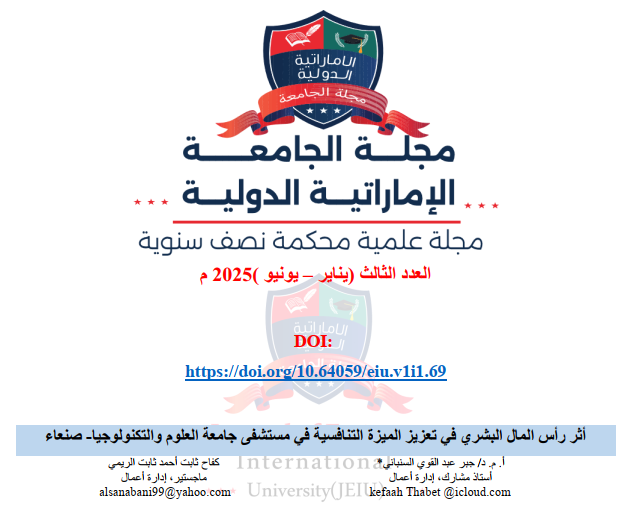أثر رأس المال البشري في تعزيز الميزة التنافسية في مستشفى جامعة العلوم والتكنولوجيا- صنعاء
DOI:
https://doi.org/10.64059/eiu.v3i3.69الكلمات المفتاحية:
رأس المال البشري، الميزة التنافسية، مستشفى جامعة العلوم والتكنولوجياالملخص
هدفت هذه الدراسة إلى تحديد أثر رأس المال البشري بأبعاده: المعرفة، المهارة، الخبرة، والإبداع، في تعزيز الميزة التنافسية بأبعادها: التكلفة، الجودة، المرونة، والوقت، في مستشفى جامعة العلوم والتكنولوجيا بصنعاء، إضافة إلى التعرف على مستوى توافر رأس المال البشري ومستوى ممارسة الميزة التنافسية في المستشفى. لتعزيز أهداف الدراسة، تم استخدام المنهج الوصفي التحليلي واعتمدت الاستبانة كأداة لجمع البيانات، حيث طبقت الدراسة على مجتمعها المستهدف، الذي يشمل جميع القيادات الإدارية في المستشفى، مثل المدير العام ونوابه، ومديري الإدارات، ورؤساء الأقسام، ومسؤولي الوحدات، باستخدام طريقة المسح الشامل لجميع أفراد المجتمع البالغ عددهم (66) عنصراً. اعتمدت الدراسة على استخدام الأساليب الإحصائية المناسبة من خلال برنامج الحزم الإحصائية (SPSS). توصلت الدراسة إلى مجموعة من الاستنتاجات المهمة أبرزها أن المستشفى أظهر اهتمامًا كبيرًا برأس المال البشري في جميع أبعاده التي جاءت مرتبة تنازليًا كالآتي: الخبرة، المعرفة، المهارات، والإبداع. كما بينت الدراسة اهتمام المستشفى بالميزة التنافسية بجميع أبعادها، التي جاءت مرتبة تنازليًا كالآتي: الجودة، المرونة، الوقت، والتكلفة. أوضحت الدراسة وجود أثر ذو دلالة إحصائية لرأس المال البشري في تعزيز الميزة التنافسية بالمستشفى، كما كشفت عن وجود فروق ذات دلالة إحصائية بين متوسطات إجابات أفراد عينة الدراسة فيما يخص رأس المال البشري والميزة التنافسية، تعزى إلى المتغيرات الديموغرافية مثل الجنس، العمر، المؤهل العلمي، عدد سنوات الخدمة، والمسمى الوظيفي.
بناءً على ما سبق، أوصت الدراسة بضرورة تعزيز اهتمام المستشفى برأس المال البشري باعتباره رأس المال الحقيقي والعنصر الأساسي في نجاح المؤسسات ومصدرًا رئيسيًا للميزة التنافسية في ظل التطور التكنولوجي السريع والتحديات المستمرة في بيئة الأعمال، مع التأكيد على ضرورة تعزيز الاهتمام بالميزة التنافسية في جميع أبعادها والعمل على تحسينها باستمرار.
المراجع
أبو هادي، أحمد جابر. (2019). أثر رأس المال الفكري في تعزيز الميزة التنافسية المستدامة من خلال إستراتيجيات الريادة: دراسة ميدانية في الشركات اليمنية للصناعات الغذائية (أطروحة دكتوراه). جامعة العلوم والتكنولوجيا، صنعاء، اليمن.
براهيمي، كريمة. (2019). أثر رأس المال البشري على الأداء التنظيمي في المؤسسات الاستقلالية الخاصة. مجلة التنمية والاقتصاد التطبيقي، 3(2). جامعة المسيلة، الجزائر.
البشاري، نجيب محمد يحيى أحمد. (2019). أثر التمكين الإداري في تعزيز الميزة التنافسية للأدوية (أطروحة دكتوراه). كلية العلوم الإدارية، جامعة العلوم والتكنولوجيا، اليمن.
البنك الدولي. (2021). القطاع الصحي في اليمن – وثيقة الملاحظات. تم الاسترجاع في 4 يونيو 2021 من https://www.worldbank.org/en/country/yemen/publication/health-sector-in-yemen-policy-note
الجماعي، رامية محمد قايد. (2019). دور أخلاقيات التسويق في تعزيز الميزة التنافسية للمصارف الإسلامية اليمنية (رسالة ماجستير). الأكاديمية اليمنية للدراسات العليا، قسم العلوم الإدارية والمالية، صنعاء، اليمن.
الجيار، مدحت، حميري. (2020). الرشاقة الإستراتيجية وأثرها في تعزيز الميزة التنافسية (رسالة ماجستير). جامعة الأقصى، غزة، فلسطين.
الرفيق، محمد يحيى. (2018). تطلعات إدارة رأس المال البشري في المصارف نحو رأس المال الفكري – دراسة تطبيقية على عينة من البنوك التجارية اليمنية. مجلة الآداب العلمية، 9، اليمن.
الروسان، محمود علي، والعجلوني، محمود محمد. (2010). أثر رأس المال الفكري في الإبداع في المصارف الأردنية. مجلة جامعة دمشق للعلوم الاقتصادية والقانونية، 42.
الريمي، نعمة أحمد. (2023). أثر القيادة الإستراتيجية في تطوير رأس المال البشري – دراسة ميدانية في المستشفيات الأهلية بأمانة العاصمة صنعاء (رسالة ماجستير). كلية العلوم الإدارية، جامعة العلوم والتكنولوجيا، اليمن.
سعيد، فيصل هزاع قايد. (2020). أثر الإبداع المنظمي في تعزيز الميزة التنافسية المستدامة من خلال المرونة الإستراتيجية (أطروحة دكتوراه). جامعة العلوم والتكنولوجيا، كلية العلوم الإدارية، صنعاء، اليمن.
فايع، إبراهيم علي حسن. (2020). دور التفكير الاستراتيجي في تعزيز الميزة التنافسية بالمؤسسة العامة لمطابع الكتاب المدرسي في الجمهورية اليمنية (رسالة ماجستير). الأكاديمية اليمنية للدراسات العليا، قسم العلوم الإدارية والمالية، صنعاء، اليمن.
فوزي، عبد الباسط. (2019). أثر رأس المال البشري على الأداء التنظيمي في المؤسسات الاستقلالية الخاصة، المجلة العربية للإدارة، 39(3).
الماخذي، تقية أحمد عبد الرحمن. (2022). أثر تطبيق مبادئ الجودة الشاملة في تعزيز الميزة التنافسية: دراسة ميدانية في شركات صناعة الأدوية اليمنية (رسالة ماجستير). كلية العلوم الإدارية، جامعة العلوم والتكنولوجيا، اليمن.
المدهون، خالد محمد. (2020). أثر رأس المال البشري في تعزيز الميزة التنافسية في البنوك. مجلة دراسات الأعمال والإدارة، 2(2). جامعة فلسطين، غزة.
مسعود، نشوان محمد سيف. (2022). الابتكار التسويقي في خدمات الاتصالات وأثره في تعزيز الميزة التنافسية – دراسة ميدانية على شركات الاتصالات بالجمهورية اليمنية (رسالة ماجستير). جامعة العلوم والتكنولوجيا، كلية العلوم الإدارية، صنعاء، اليمن.
أبو سالم، أبوبكر، (2013)، "دور سياسة تمكين العاملين في تعزيز الميزة التنافسية المستدامة، دراسة ميدانية على شركات سونال طرال البترولية، رسالة ماجستير، كلية العلوم الاقتصادية، جامعة سطيف، الجزائر.
الجميلي، طه علي (2014)، أثر تدريب الموارد البشرية بتعزيز الميزة التنافسية في المصارف العراقية –دراسة ميدانية في المصارف العراقية غير الحكومية، أطروحة دكتوراه، جامعة دمشق، سوريا.
Abel, Jaison R., & Deitz, Richard. (2012). The role of colleges and universities in building local human capital. Current Issues in Economics and Finance, 17(6), 1-7.
Aluko, Yetunde, & Aluko, Ola. (2011). Human capital development: Nigeria's great challenge. Journal of Sustainable Development in Africa, 13(7), 131-144.
Denton, D. Keith. (1994). The power of flexibility. Business Horizons, 37(4), 43-47.
Gutierrez, Jose Sanchez, Trejo, Juan Mejia, Barraza, Juan Antonio Vargas, & Avila, Guillermo Vazquez. (2016). Intellectual capital impact factor on competitiveness: Manufacturing industry SMEs in Mexico. Measuring Business Excellence, 20(1), 1-11.
Hill, Charles W. L., & Jones, Gareth R. (2001). Strategic management theory (5th ed.). Houghton Mifflin.
Porter, Michael E. (1985). Competitive advantage: Creating and sustaining superior performance. The Free Press, New York, USA.
Sadq, Zana Mohammed, Mohammed, Hawre Omer, Othman, Behzad, & Saeed, Vain Sardar. (2020). Attitudes of managers in the knowledge private competitive advantages. Test Engineering and Management, 82, 393-401.
Woodhall, Maureen. (1987). Human capital concepts. In G. Sotiropoulos (Ed.), Economics of education: Research and studies (pp. 21-223). Pergamon, Oxford.




